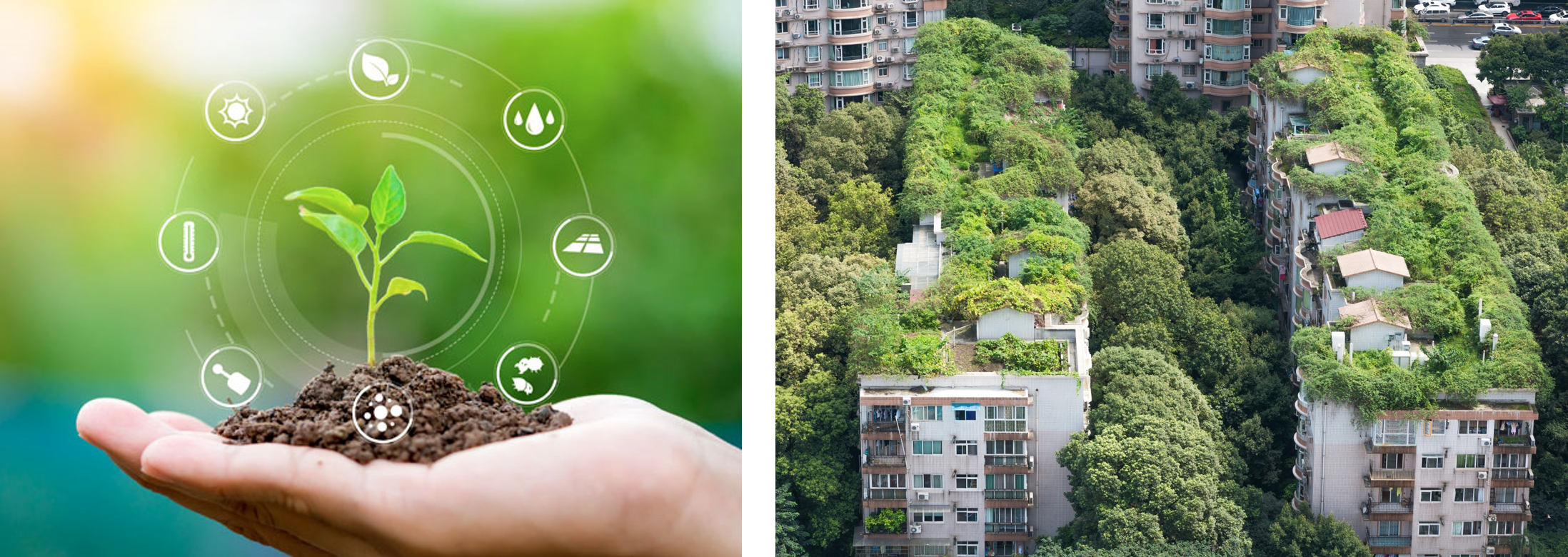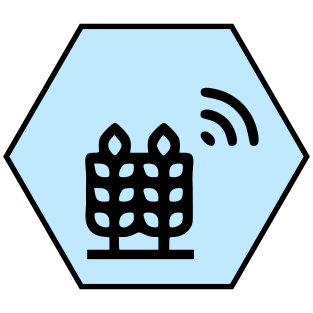The aim of the Green Technologies and Bioeconomy is to use innovation in the field of natural resources, agriculture and food processing to ensure sustainable management, smart agriculture and forestry, and sustainable food production for the Czech Republic, and to contribute towards a healthy and quality environment and biodiversity.
The domain is included under the thematic area Sustainable agriculture and environmental sectors.

Why are green technologies and bioeconomy included among the RIS3 priorities?
- This is a critical area necessary to prevent risks that can threaten the long-term prosperity of the economy and society.
- The application of advanced technologies (including biotechnologies) and materials (including biomaterials and nanomaterials) is becoming increasingly important in agriculture, food production, environmental protection and other sectors
- As in all other application sectors, digital technologies (including ICT and artificial intelligence) are developing rapidly
- Climate change and the impact of a changing climate on the landscape requires changes in the management and use of natural resources
- The worldwide trend of expanding implementation of systems using automation of agricultural activities (Agriculture 4.0, precision agriculture);
- Increasing social and political demand for sustainable development, the use of materials from renewable sources and secondary raw materials, and the minimisation of the negative impact of human activities on the environment;
- The need to reduce energy consumption and optimise energy use, which is high in the agriculture and food sectors, is creating demand for a larger use of elements of the bioeconomy and circular economy;
- Increasing demands on food safety and quality
Application sectors in the thematic area
The thematic area Sustainable Agriculture and Environmental Sectors comprises five application sectors:
- Sustainable management of natural resources (Natural resource management)
- Sustainable agriculture and forestry (Agriculture and forestry)
- Sustainable food production (Food production)
- Ensuring a healthy and quality environment, biodiversity and natural resource ecology (Environment and Biodiversity)
- Sustainable construction, human settlements and technical environmental protection (Construction and Human Settlements)
Strategic themes for research and innovation in application sectors
The Green Technologies, Bioeconomy and Sustainable Food Sources domain specified three strategic themes in the application sectors:
- Bioeconomy
- Smart agriculture
- Global change
Bioeconomy
The strategic theme with its interdisciplinary reach helps individual sectors to transform the current economy towards sustainable development and can help reduce the impacts of climate change, reduce the use of non-renewable raw materials, increase the value added from biomaterials in parallel with reduced energy consumption, use nutrients and energy from waste and by-products as additional end products, and optimise the value and contribution of ecosystem services to the economy. Bioeconomy should be seen as a transformation of society towards a more sustainable development using biological resources across sectors such as agriculture, forestry, aquaculture, food industry, energy, bioenergy, bio-based production of products, chemical industry, biotechnology sector, pharmaceuticals). Bioeconomy can be seen as a multidisciplinary field
Smart agriculture
Smart agriculture refers to all agricultural activities such as livestock production, crop production, forest eco-systems, forestry, revitalisation, new cultivation systems and food activities, where elements of digitalisation, automation, robotics, precision farming and the use of sensors are applied to enable targeted use of heterogeneity to optimise activities and intervention while minimising negative impacts on the landscape. In the historical sequence of qualitative changes, the term Agriculture 4.0 has also been introduced. It affects all parts of the agricultural value chain, even outside the farm. The role of the farmer will undoubtedly require more knowledge in information technology and data analysis. Hand in hand with this, the role of agricultural research will grow, opening up a new dimension even in fields that were inherent to industrial activity. Combining the Agriculture and IT domains will increase efficiency and precision in the agricultural field and respond flexibly to the changing conditions associated with climate change, agri-environmental measures and the market environment.
Global change
Global changes in the biosphere are increasingly affecting, and to some extent threatening, the further development of global human society. The agricultural sector, including forestry, and natural resources (biodiversity, water, soil) are among the most threatened areas. The contribution of human activity is decisive in some aspects, while in others it is expected to be significant (climate change). The agricultural and forestry sector is exposed to the effects of global change in the first instance. On the other hand, it has considerable potential for adaptation and mitigation. The issue of tackling and preventing the effects of climate change is therefore a major focus of research, which is more concerned with diversity and the management of basic natural resources and genetic resources.

Key enabling technologies in the Green Technology, Bioeconomy and Sustainable Food Sources domain
Applied research and experimental development in sustainable agriculture and environmental sectors can focus on all key enabling technologies. Each of them can be used to innovate in all application sectors belonging to this domain, but also in other areas.
- Photonics and micro-/nano-electronics
- Advanced materials and nanotechnology
- Biotechnology
- Advanced manufacturing technologies
- Artificial Intelligence
- Digital security and connectivity
The specific research and innovation themes for key enabling technologies in this domain can be found in Annex 1 to the National RIS3.
More detailed general information on key enabling technologies can be found here.
Themes concerning social sciences, humanities and arts in the Green Technology and Bioeconomy domain
The following SSHA themes will be explored and developed in this domain:
- Research on the interrelationships between society, technology and innovation
- Addressing 21st century societal challenges associated with emerging technologies
- Conditions/barriers to the application of innovative technologies and practices
Specific research topics in the social sciences, humanities and arts in this domain can be found in Annex 1 to the National RIS3.
More detailed general information on the themes of social sciences, humanities and arts can be found here.
National Innovation Platform Sustainable Agriculture and Environmental Industries
National Innovation Platforms are working groups where the entrepreneurial discovery process (EDP) is put into practice.
The domain of Green Technologies and Bioeconomy is discussed in the National Innovation Platform VI - Sustainable Agriculture and Environmental Sector, where representatives of business, research and public spheres meet; this is known as the Triple Helix model.
Contacts:
Professional guarantor of National Innovation Platform VI - Sustainable Agriculture and Environmental Sector: Jan Nedělník, Výzkumný ústav pícninářský, nedelnik@vupt.cz
Secretary of National Innovation Platform VI - Sustainable Agriculture and Environmental Sector: Jana Fišerová, MIT CR, fiserova@mpo.cz

